Unit 6 Section A (GF-3c) 课件(人教新目标七年级上Unit 6 Do you like bananas)
文档属性
| 名称 | Unit 6 Section A (GF-3c) 课件(人教新目标七年级上Unit 6 Do you like bananas) |

|
|
| 格式 | pptx | ||
| 文件大小 | 2.6MB | ||
| 资源类型 | 试卷 | ||
| 版本资源 | 人教新目标(Go for it)版 | ||
| 科目 | 英语 | ||
| 更新时间 | 2023-11-03 08:32:09 | ||
图片预览


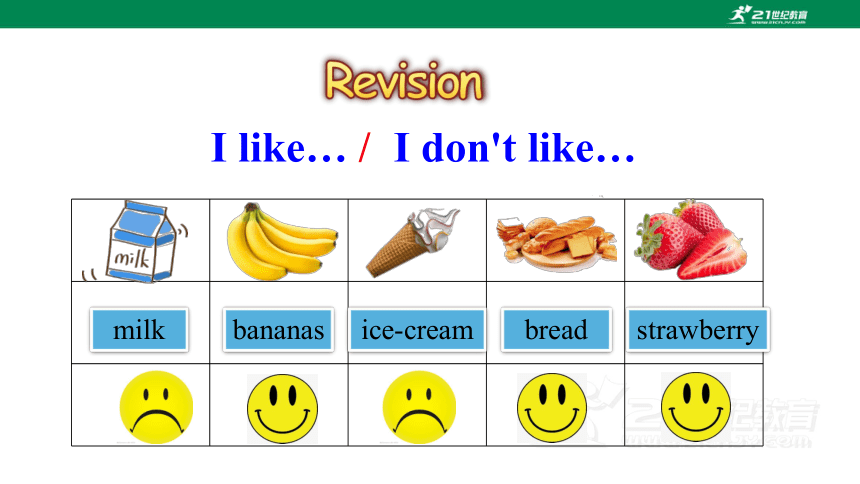

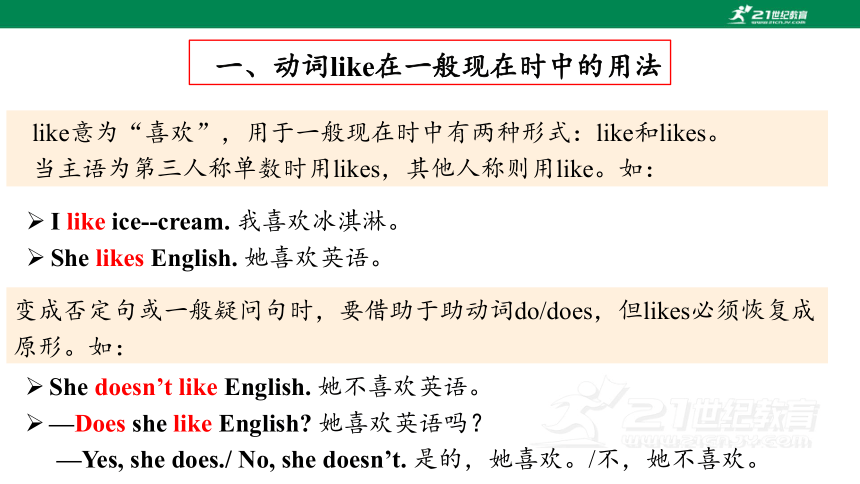
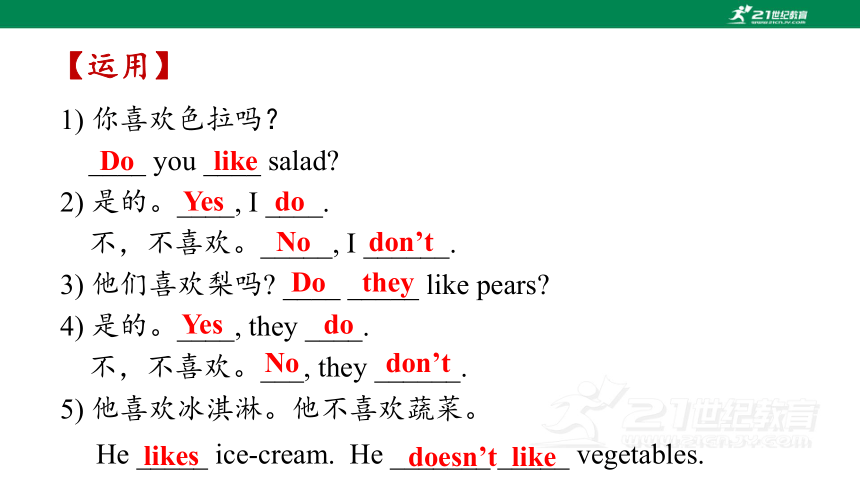
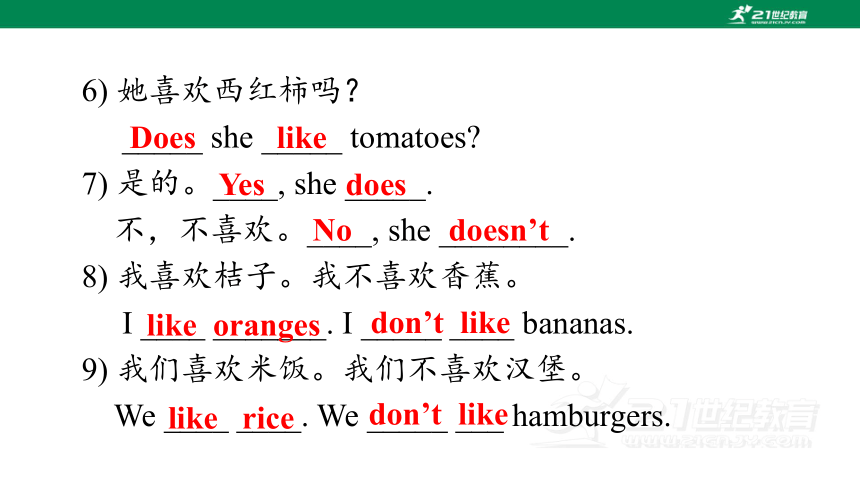
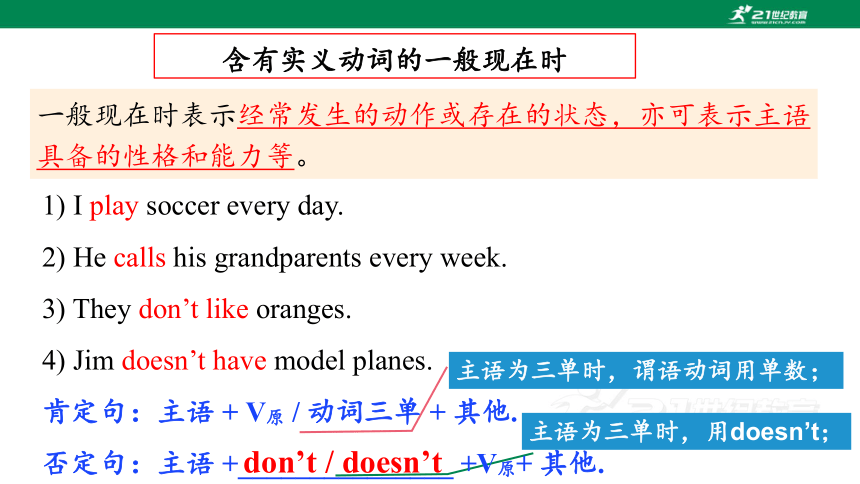
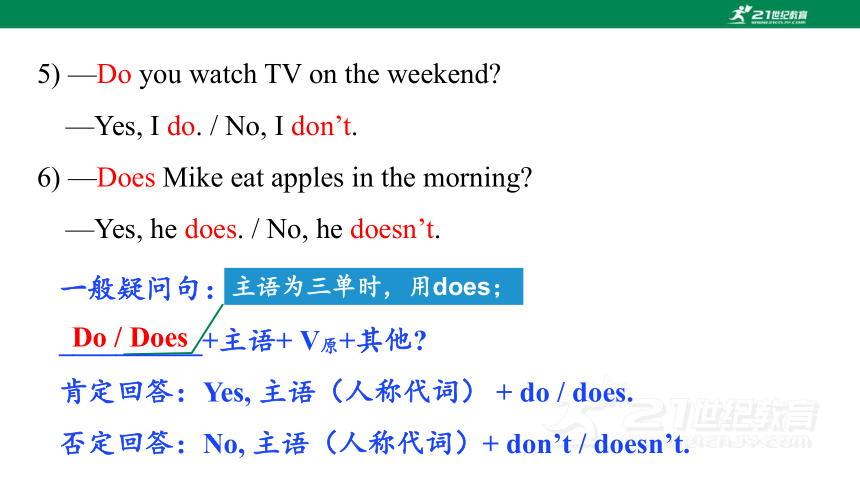
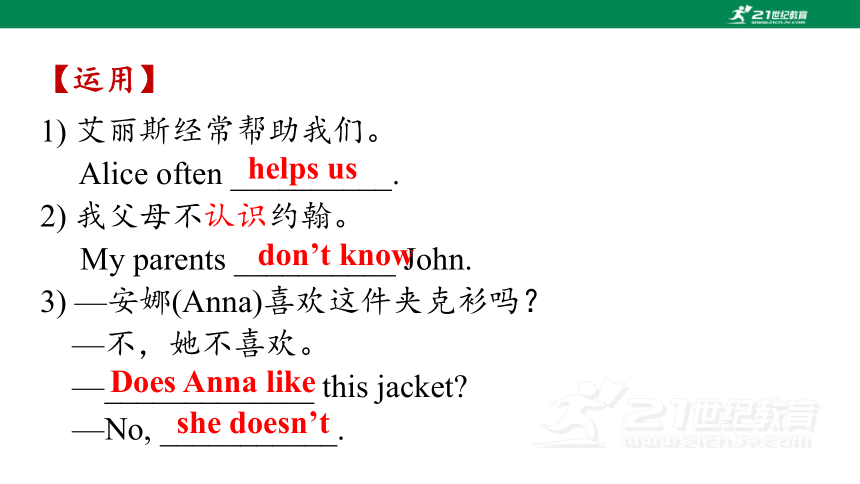
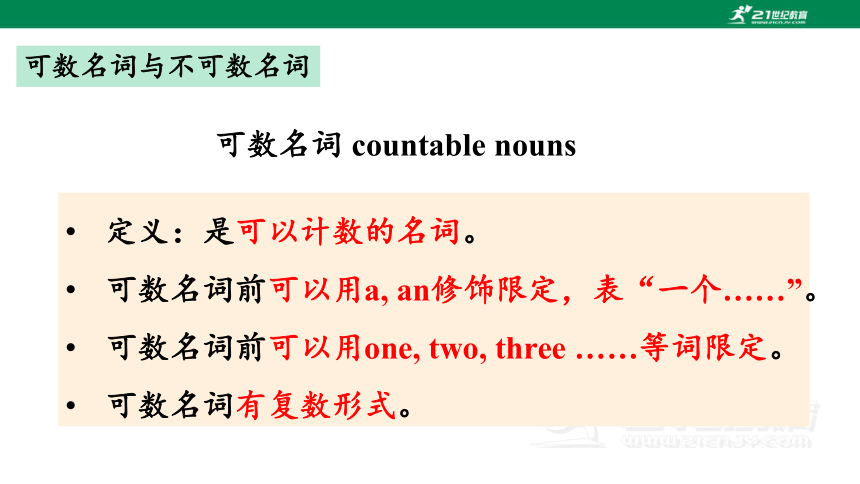
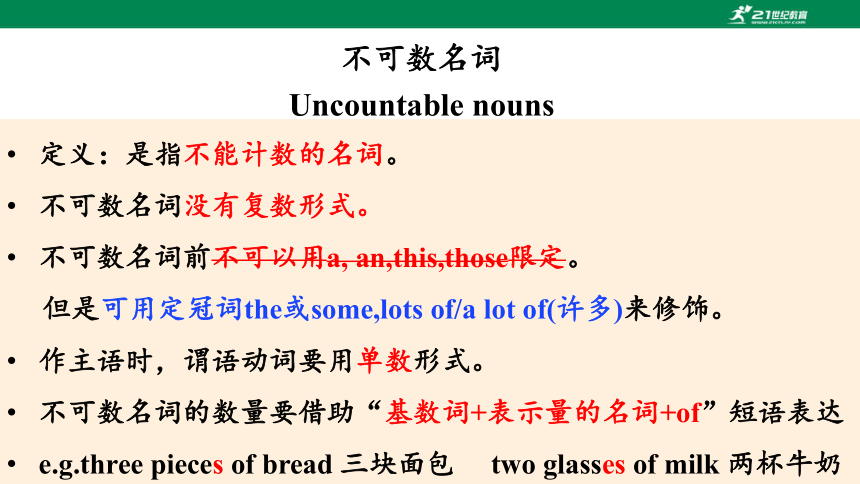
文档简介
(共35张PPT)
Unit 6 Do you like bananas
人教版七年级上 册
Section A (GF-3c)
Learning objectives
Key words & phrases:
banana, hamburger, tomato, ice-cream, salad, apple, strawberry, pear, milk, bread, vegetable, fruit, dinner, birthday, week, food, sure, right, then, think about, How about...
Key sentences:
1. John’s birthday dinner is next week.
2.—Let’s think about the food. —I like hamburgers.
3.—What about the fruit —I like strawberries and apples.
4.—Do you like tomatoes —No, I don’t.
To learn to talk about likes and dislikes.
I like… /
I don't like…
Revision
milk
bananas
ice-cream
bread
strawberry
Grammar Focus
like意为“喜欢”,用于一般现在时中有两种形式:like和likes。
当主语为第三人称单数时用likes,其他人称则用like。如:
I like ice -cream. 我喜欢冰淇淋。
She likes English. 她喜欢英语。
变成否定句或一般疑问句时,要借助于助动词do/does,但likes必须恢复成原形。如:
She doesn’t like English. 她不喜欢英语。
—Does she like English 她喜欢英语吗?
—Yes, she does./ No, she doesn’t. 是的,她喜欢。/不,她不喜欢。
一、动词like在一般现在时中的用法
1) 你喜欢色拉吗?
____ you ____ salad
2) 是的。____, I ____.
不,不喜欢。_____, I ______.
3) 他们喜欢梨吗 ____ _____ like pears
4) 是的。____, they ____.
不,不喜欢。___, they ______.
Do like
Do they
Yes do
No don’t
No don’t
Yes do
5) 他喜欢冰淇淋。他不喜欢蔬菜。
He _____ ice-cream. He _______ _____ vegetables.
likes
doesn’t like
【运用】
6) 她喜欢西红柿吗?
_____ she _____ tomatoes
7) 是的。____, she _____.
不,不喜欢。____, she ________.
8) 我喜欢桔子。我不喜欢香蕉。
I ____ _______. I _____ ____ bananas.
9) 我们喜欢米饭。我们不喜欢汉堡。
We ____ ____. We _____ ___ hamburgers.
Yes does
like rice
No doesn’t
don’t like
Does like
like oranges
don’t like
1) I play soccer every day.
2) He calls his grandparents every week.
3) They don’t like oranges.
4) Jim doesn’t have model planes.
肯定句:主语 + V原 / 动词三单 + 其他.
否定句:主语 +_______________ +V原+ 其他.
don’t / doesn’t
一般现在时表示经常发生的动作或存在的状态,亦可表示主语具备的性格和能力等。
含有实义动词的一般现在时
主语为三单时,谓语动词用单数;
主语为三单时,用doesn’t;
5) —Do you watch TV on the weekend
—Yes, I do. / No, I don’t.
6) —Does Mike eat apples in the morning
—Yes, he does. / No, he doesn’t.
一般疑问句:
__________+主语+ V原+其他
肯定回答:Yes, 主语(人称代词) + do / does.
否定回答:No, 主语(人称代词)+ don’t / doesn’t.
Do / Does
主语为三单时,用does;
1) 艾丽斯经常帮助我们。
Alice often __________.
2) 我父母不认识约翰。
My parents __________ John.
3) —安娜(Anna)喜欢这件夹克衫吗?
—不,她不喜欢。
—_____________ this jacket
—No, ___________.
helps us
don’t know
Does Anna like
she doesn’t
【运用】
可数名词与不可数名词
可数名词 countable nouns
定义:是可以计数的名词。
可数名词前可以用a, an修饰限定,表“一个……”。
可数名词前可以用one, two, three ……等词限定。
可数名词有复数形式。
不可数名词
Uncountable nouns
定义:是指不能计数的名词。
不可数名词没有复数形式。
不可数名词前不可以用a, an,this,those限定。
但是可用定冠词the或some,lots of/a lot of(许多)来修饰。
作主语时,谓语动词要用单数形式。
不可数名词的数量要借助“基数词+表示量的名词+of”短语表达
e.g.three pieces of bread 三块面包 two glasses of milk 两杯牛奶
定义:在某些情况下能计数,在某些情况下不能计数的名词。
food (泛指食物,不可数)→foods (食物种类,可数)
fruit (一般水果,不可数)→fruits (水果种类,可数)
chicken (鸡肉,不可数)→chickens (鸡,可数)
orange (橙色;橙汁,不可数)→oranges (橙子,可数)
既可数又不可数名词
countable nouns and Uncountable nouns
many, a few , few
much , a little , little
a lot of , lots of , some
可数名词的复数形式构成
加-s
1. -s在清辅音后读[s]
2. -s在浊辅音后读[z]
3. -s在元音后读[z]
4. 以音素[ s , z , ,d ] ]等结尾的,读[iz]
desks
dogs
trees
oranges
以-s, -x, -sh, -ch 结尾的
加-es
-es读[iz]
boxes
watches
以 f 或 fe 结尾的
改f或fe为v 再加-es
-ves读[vz]
knives
wives
妻子(wife)持刀(knife)去宰狼(wolf),小偷(thief)吓得发了慌。
躲在架(shelf)后保己(self)命(life),半(half)片树叶(leaf)遮目光。
改y为i 再加-es
-ies读[iz]
families
dictionaries
以元音字母
加y结尾的
加-s
-s读[z]
boys
keys
以o 结尾的
有生命的事物加-es
-es读[z]
tomatoes
potatoes
以辅音字母加y结尾的
无生命的事物加-s
-s读[z]
photos
radios
黑人英雄爱吃土豆西红柿。
Negroes , heroes , potatoes , tomatoes .
可数名词复数形式的不规则变化
1)中日不变英法变,其他一律加s。
Chinese ; Japanese ; Englishmen ; Frenchmen ;Germans ; Indians ; Americans
2) 大鹅长牙会走路,ee代替了oo
goose---geese ; tooth---teeth ; foot---feet
3) 鹿羊鱼单复同
deer---deer ; sheep---sheep ; fish---fish
4) 特殊变化
stomach---stomachs ; mouse---mice ;
man---men ; woman---women ; child---children
复合名词变复数
通常情况:前不变后变,遇到woman/man前后都要变。
boy friend---boy friends
paper bag---paper bags
woman teacher---women teachers
man doctor---men doctors
常见的不可数名词
粉末/颗粒类,如:flour(面粉),rice(米饭)
液体、气体等,如:water(水),air(空气)
语言、学科等,如:English(英语),Chinese(汉语)
肉类,如:beef(牛肉),pork(猪肉)
油脂类,如:oil(油),butter(黄油)
一些抽象名词,如:knowledge(知识),friendship(友谊)
既可数又不可数名词
有些名词既可作可数名词,又可作不可数名词, 但词义不同。
3a
1. I like fruit, but I (don’t / doesn’t) like vegetables.
2. She (like / likes) bread, but she (doesn’t / don’t) like salad.
3. He (like / likes) bananas, but he (don’t / doesn’t) like oranges.
4. We (likes / like) hamburgers, but we don’t (like / likes) chicken.
5. They (likes / like) pears, but they (don’t / doesn’t) like strawberries.
Underline the correct words in the brackets.
but前面是肯定描述
but后面是否定描述
3b
Number these sentences [1-4] to make a conversation.
A: Do you like salad
B: Yes, I do.
A: So, let’s get salad.
B: OK.
So, let’s get salad. Yes, I do. Do you like salad OK.
3
2
1
4
So what are you going to do next
那么接下来你要做什么?
so作连词,在句中表示“那么”,位于句首用于引出评论或问题。
3c
Ask your classmates about the food in the chart. Find out what they like and don’t like.
hamburgers
oranges
milk
salad
strawberries
tomatoes
bananas
ask sb about sth 问某人关于某事
find out 发现;找到;查明
Report:
Liu Li likes …(and...), but Zhang Jun doesn’t like …(or)....
pear
Exercises
把苹果放到合适的篮子里。
chicken
pear
salad
banana
orange
bread
milk
milk
orange
banana
bread
salad
pear
chicken
可数名词
可数/不可数名词
不可数名词
Exercises
写出下列单词的复数形式
1.hamburger __________
2.dictionary ___________
3.strawberry ____________
4.watch __________
5.class________
hamburgers
dictionaries
strawberries
watches
classes
用所给单词的适当形式填空
1.Tony ________ (have) a big hamburger.
2.My father ________ (like) oranges very much.
3.Mr. Brown ___________ (not like) tomatoes.
4.My sister ________(like) bread and milk for breakfast.
5.Miss Gao ________ (eat) a lot of healthy food.
has
likes
doesn't like
likes
eats
6. The ________ (apple) on the tree are green.
7. I like ___________ (vegetable), but I don’t like fruit.
apples
vegetables
8. Here’s some ________ (rice).
9. How about ________ (carrot) Do you like them
10. Look! There are five _____ (egg) on the table.
11. Cindy doesn’t like eating ________ (chicken).
rice
carrots
eggs
chicken
单项选择。
1. Wu Ling likes pears but she ___ bananas.
A. likes B. don’t like C. doesn’t like
2. — _____ your brother like hamburgers — Yes, ______.
A. Do; they do B. Does; he does C. Are; they are
3. We don’t have ______. Let’s go and buy (买) some tomatoes and carrots.
A. vegetables B. food C. hamburger
C
B
A
4. Look! The chicken ______ on the table and the pears ______ in the bag.
A. is; is B. are; are C. is; are
5. — Let’s ______ some vegetable salad then.
— Sounds good.
A. like B. have C. find
C
B
按要求完成下列各题,每空一词
1.He likes ice cream.(改为否定句)
He________ ________ ice cream.
2.We like carrots for dinner.(改为一般疑问句)
________ you ________ carrots for dinner
3.Tom loves vegetables.(改为一般疑问句,并作肯定回答)
—________ Tom________ vegetables
—Yes, he ________.
doesn't like
Does love
Do like
does
4.They have rice for lunch.(改为否定句)
They________ ________ rice for lunch.
5.My brother likes oranges.(对画线部分提问)
________ ________ your brother ________?
don't have
What does like
Homework
1.Review the new words and expressions in this period.
2. Ask your partners what food they like and don’t like.
3.Do the exercises in students’ book.
谢谢
21世纪教育网(www.21cnjy.com)
中小学教育资源网站
兼职招聘:
https://www.21cnjy.com/recruitment/home/admin
Unit 6 Do you like bananas
人教版七年级上 册
Section A (GF-3c)
Learning objectives
Key words & phrases:
banana, hamburger, tomato, ice-cream, salad, apple, strawberry, pear, milk, bread, vegetable, fruit, dinner, birthday, week, food, sure, right, then, think about, How about...
Key sentences:
1. John’s birthday dinner is next week.
2.—Let’s think about the food. —I like hamburgers.
3.—What about the fruit —I like strawberries and apples.
4.—Do you like tomatoes —No, I don’t.
To learn to talk about likes and dislikes.
I like… /
I don't like…
Revision
milk
bananas
ice-cream
bread
strawberry
Grammar Focus
like意为“喜欢”,用于一般现在时中有两种形式:like和likes。
当主语为第三人称单数时用likes,其他人称则用like。如:
I like ice -cream. 我喜欢冰淇淋。
She likes English. 她喜欢英语。
变成否定句或一般疑问句时,要借助于助动词do/does,但likes必须恢复成原形。如:
She doesn’t like English. 她不喜欢英语。
—Does she like English 她喜欢英语吗?
—Yes, she does./ No, she doesn’t. 是的,她喜欢。/不,她不喜欢。
一、动词like在一般现在时中的用法
1) 你喜欢色拉吗?
____ you ____ salad
2) 是的。____, I ____.
不,不喜欢。_____, I ______.
3) 他们喜欢梨吗 ____ _____ like pears
4) 是的。____, they ____.
不,不喜欢。___, they ______.
Do like
Do they
Yes do
No don’t
No don’t
Yes do
5) 他喜欢冰淇淋。他不喜欢蔬菜。
He _____ ice-cream. He _______ _____ vegetables.
likes
doesn’t like
【运用】
6) 她喜欢西红柿吗?
_____ she _____ tomatoes
7) 是的。____, she _____.
不,不喜欢。____, she ________.
8) 我喜欢桔子。我不喜欢香蕉。
I ____ _______. I _____ ____ bananas.
9) 我们喜欢米饭。我们不喜欢汉堡。
We ____ ____. We _____ ___ hamburgers.
Yes does
like rice
No doesn’t
don’t like
Does like
like oranges
don’t like
1) I play soccer every day.
2) He calls his grandparents every week.
3) They don’t like oranges.
4) Jim doesn’t have model planes.
肯定句:主语 + V原 / 动词三单 + 其他.
否定句:主语 +_______________ +V原+ 其他.
don’t / doesn’t
一般现在时表示经常发生的动作或存在的状态,亦可表示主语具备的性格和能力等。
含有实义动词的一般现在时
主语为三单时,谓语动词用单数;
主语为三单时,用doesn’t;
5) —Do you watch TV on the weekend
—Yes, I do. / No, I don’t.
6) —Does Mike eat apples in the morning
—Yes, he does. / No, he doesn’t.
一般疑问句:
__________+主语+ V原+其他
肯定回答:Yes, 主语(人称代词) + do / does.
否定回答:No, 主语(人称代词)+ don’t / doesn’t.
Do / Does
主语为三单时,用does;
1) 艾丽斯经常帮助我们。
Alice often __________.
2) 我父母不认识约翰。
My parents __________ John.
3) —安娜(Anna)喜欢这件夹克衫吗?
—不,她不喜欢。
—_____________ this jacket
—No, ___________.
helps us
don’t know
Does Anna like
she doesn’t
【运用】
可数名词与不可数名词
可数名词 countable nouns
定义:是可以计数的名词。
可数名词前可以用a, an修饰限定,表“一个……”。
可数名词前可以用one, two, three ……等词限定。
可数名词有复数形式。
不可数名词
Uncountable nouns
定义:是指不能计数的名词。
不可数名词没有复数形式。
不可数名词前不可以用a, an,this,those限定。
但是可用定冠词the或some,lots of/a lot of(许多)来修饰。
作主语时,谓语动词要用单数形式。
不可数名词的数量要借助“基数词+表示量的名词+of”短语表达
e.g.three pieces of bread 三块面包 two glasses of milk 两杯牛奶
定义:在某些情况下能计数,在某些情况下不能计数的名词。
food (泛指食物,不可数)→foods (食物种类,可数)
fruit (一般水果,不可数)→fruits (水果种类,可数)
chicken (鸡肉,不可数)→chickens (鸡,可数)
orange (橙色;橙汁,不可数)→oranges (橙子,可数)
既可数又不可数名词
countable nouns and Uncountable nouns
many, a few , few
much , a little , little
a lot of , lots of , some
可数名词的复数形式构成
加-s
1. -s在清辅音后读[s]
2. -s在浊辅音后读[z]
3. -s在元音后读[z]
4. 以音素[ s , z , ,d ] ]等结尾的,读[iz]
desks
dogs
trees
oranges
以-s, -x, -sh, -ch 结尾的
加-es
-es读[iz]
boxes
watches
以 f 或 fe 结尾的
改f或fe为v 再加-es
-ves读[vz]
knives
wives
妻子(wife)持刀(knife)去宰狼(wolf),小偷(thief)吓得发了慌。
躲在架(shelf)后保己(self)命(life),半(half)片树叶(leaf)遮目光。
改y为i 再加-es
-ies读[iz]
families
dictionaries
以元音字母
加y结尾的
加-s
-s读[z]
boys
keys
以o 结尾的
有生命的事物加-es
-es读[z]
tomatoes
potatoes
以辅音字母加y结尾的
无生命的事物加-s
-s读[z]
photos
radios
黑人英雄爱吃土豆西红柿。
Negroes , heroes , potatoes , tomatoes .
可数名词复数形式的不规则变化
1)中日不变英法变,其他一律加s。
Chinese ; Japanese ; Englishmen ; Frenchmen ;Germans ; Indians ; Americans
2) 大鹅长牙会走路,ee代替了oo
goose---geese ; tooth---teeth ; foot---feet
3) 鹿羊鱼单复同
deer---deer ; sheep---sheep ; fish---fish
4) 特殊变化
stomach---stomachs ; mouse---mice ;
man---men ; woman---women ; child---children
复合名词变复数
通常情况:前不变后变,遇到woman/man前后都要变。
boy friend---boy friends
paper bag---paper bags
woman teacher---women teachers
man doctor---men doctors
常见的不可数名词
粉末/颗粒类,如:flour(面粉),rice(米饭)
液体、气体等,如:water(水),air(空气)
语言、学科等,如:English(英语),Chinese(汉语)
肉类,如:beef(牛肉),pork(猪肉)
油脂类,如:oil(油),butter(黄油)
一些抽象名词,如:knowledge(知识),friendship(友谊)
既可数又不可数名词
有些名词既可作可数名词,又可作不可数名词, 但词义不同。
3a
1. I like fruit, but I (don’t / doesn’t) like vegetables.
2. She (like / likes) bread, but she (doesn’t / don’t) like salad.
3. He (like / likes) bananas, but he (don’t / doesn’t) like oranges.
4. We (likes / like) hamburgers, but we don’t (like / likes) chicken.
5. They (likes / like) pears, but they (don’t / doesn’t) like strawberries.
Underline the correct words in the brackets.
but前面是肯定描述
but后面是否定描述
3b
Number these sentences [1-4] to make a conversation.
A: Do you like salad
B: Yes, I do.
A: So, let’s get salad.
B: OK.
So, let’s get salad. Yes, I do. Do you like salad OK.
3
2
1
4
So what are you going to do next
那么接下来你要做什么?
so作连词,在句中表示“那么”,位于句首用于引出评论或问题。
3c
Ask your classmates about the food in the chart. Find out what they like and don’t like.
hamburgers
oranges
milk
salad
strawberries
tomatoes
bananas
ask sb about sth 问某人关于某事
find out 发现;找到;查明
Report:
Liu Li likes …(and...), but Zhang Jun doesn’t like …(or)....
pear
Exercises
把苹果放到合适的篮子里。
chicken
pear
salad
banana
orange
bread
milk
milk
orange
banana
bread
salad
pear
chicken
可数名词
可数/不可数名词
不可数名词
Exercises
写出下列单词的复数形式
1.hamburger __________
2.dictionary ___________
3.strawberry ____________
4.watch __________
5.class________
hamburgers
dictionaries
strawberries
watches
classes
用所给单词的适当形式填空
1.Tony ________ (have) a big hamburger.
2.My father ________ (like) oranges very much.
3.Mr. Brown ___________ (not like) tomatoes.
4.My sister ________(like) bread and milk for breakfast.
5.Miss Gao ________ (eat) a lot of healthy food.
has
likes
doesn't like
likes
eats
6. The ________ (apple) on the tree are green.
7. I like ___________ (vegetable), but I don’t like fruit.
apples
vegetables
8. Here’s some ________ (rice).
9. How about ________ (carrot) Do you like them
10. Look! There are five _____ (egg) on the table.
11. Cindy doesn’t like eating ________ (chicken).
rice
carrots
eggs
chicken
单项选择。
1. Wu Ling likes pears but she ___ bananas.
A. likes B. don’t like C. doesn’t like
2. — _____ your brother like hamburgers — Yes, ______.
A. Do; they do B. Does; he does C. Are; they are
3. We don’t have ______. Let’s go and buy (买) some tomatoes and carrots.
A. vegetables B. food C. hamburger
C
B
A
4. Look! The chicken ______ on the table and the pears ______ in the bag.
A. is; is B. are; are C. is; are
5. — Let’s ______ some vegetable salad then.
— Sounds good.
A. like B. have C. find
C
B
按要求完成下列各题,每空一词
1.He likes ice cream.(改为否定句)
He________ ________ ice cream.
2.We like carrots for dinner.(改为一般疑问句)
________ you ________ carrots for dinner
3.Tom loves vegetables.(改为一般疑问句,并作肯定回答)
—________ Tom________ vegetables
—Yes, he ________.
doesn't like
Does love
Do like
does
4.They have rice for lunch.(改为否定句)
They________ ________ rice for lunch.
5.My brother likes oranges.(对画线部分提问)
________ ________ your brother ________?
don't have
What does like
Homework
1.Review the new words and expressions in this period.
2. Ask your partners what food they like and don’t like.
3.Do the exercises in students’ book.
谢谢
21世纪教育网(www.21cnjy.com)
中小学教育资源网站
兼职招聘:
https://www.21cnjy.com/recruitment/home/admin
同课章节目录
- starters 预备篇(2012秋审查)
- Unit 1 Good morning !
- Unit 2 What’s this in English?
- Unit 3 What color is it ?
- Unit 1 My name's Gina.
- Section A
- Section B
- Unit 2 This is my sister.
- Section A
- Section B
- Unit 3 Is this your pencil?
- Section A
- Section B
- Unit 4 Where's my schoolbag?
- Section A
- Section B
- Unit 5 Do you have a soccer ball?
- Section A
- Section B
- Unit 6 Do you like bananas?
- Section A
- Section B
- Unit 7 How much are these socks?
- Section A
- Section B
- Unit 8 When is your birthday?
- Section A
- Section B
- Unit 9 My favorite subject is science.
- Section A
- Section B
